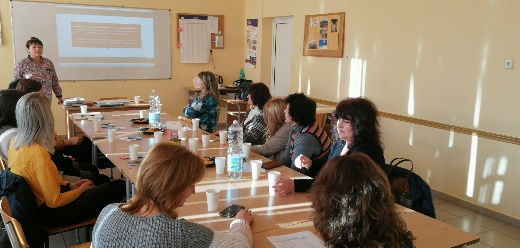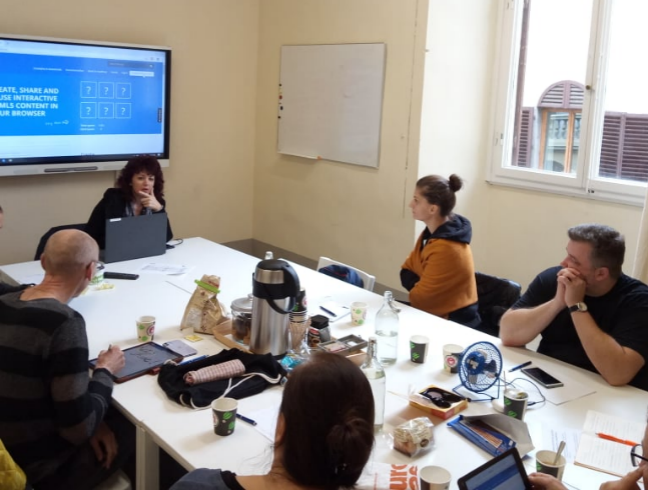
Topic(s) addressed
This project was developed as a result of deficiencies that had been identified in the teaching community, and the aim of assisting teachers at Vratsa Language School to acquire a higher level of qualification in their efforts to transform the traditional classroom environment into a more innovative one. The goal was to have a group of motivated teachers attend structured training courses at leading European educational organisations in two thematic fields: informational and communicative technologies, and new and innovative educational methods, so they would be able to implement their European experiences to their respective teaching responsibilities and share them with colleagues. Uncertain of humanity’s future challenges, the project’s goal was to modernise educational methods, stimulate innovative thinking among teachers, improve participants’ digital, linguistic, and social competences, introduce modern technologies in class, and develop lessons that correspond to the needs of contemporary students. The ongoing global state of emergency due to COVID-19 and the subsequent effects of distance learning did not come as a surprise to the school’s authorities and teachers, who as a result of the new ideas, resources, knowledge and experience gained from the project’s mobilities, could accommodate the changes brought about by the pandemic in record time. Distance education requires a radically different classroom organisational model, resulting in changes to the teacher’s role and teaching methods – with technologies playing an immensely important role in this extraordinary change. Moreover, cloud technologies provide ideal conditions for education in a virtual classroom due to the entire educational process being held remotely, which necessitates enhanced digital competence among teachers, and the 100% digitalisation of teaching materials. Although the teaching process benefitted all participants, strategically selected courses in particular had provided participants with valuable knowledge and skills during mobilities, which enabled them to implement new techniques and methods in a confident manner, with many of the school’s staff taking on the role of mentors and counsellors.
Target groups
The project’s participants consisted of EUROPASS SRL and Hrvatska Udruga pripovjedača "Pričalica.” Following the selection process, 6 well-experienced participants were chosen from a number of subject areas: Valentina Mihajlova, an English teacher with 25 years of field experience, the high school’s headmistress, and someone who has contributed to the school’s modernisation and innovation efforts; Nevelina Parvanova, a senior English teacher with 31 years of teaching experience, a participant in various school projects, and a mentor to up-and-coming teachers from the Fulbright Programme; Tanya Denova, a senior English teacher with 32 years of experience, also a mentor of up-and-coming teachers from the Fulbright Programme, and someone who guides and assists students participating in Speech and Debate Tournaments in English-BEST; Ivanka Lekova, an English teacher with 25 years of innovative work experience. Active in eTwinning and project undertakings, she is also the coordinator of Erasmus+ strategic partnership projects; Elizabeta Dimitrova, a senior teacher of History in English with 21 years of work experience, she is a coordinator for Erasmus+ Strategic partnership projects; and, Dimitrina Georgieva, with 25 years of work experience, she is the head of the ICT section and responsible for the school’s qualification courses. Georgieva is also involved in Erasmus+ projects; is the administrator of Office 365 and the electronic diary, and is also been an active member of the eTwinning project.
Methodologies
A primary goal of the Specialised Language School was to create proper conditions for the implementation of the educational policy by using the competence approach. The main priority within this education process is to enable students to utilise their cognitive, emotional, and creative abilities to solve problems, create, increase their self-confident, and learn from their mistakes – allowing them to thus learn from life experiences. We encouraged teachers to select proper educational techniques and various educational methods according to methodological units and the curriculum. As a result of the experience gained from structured courses organised by leading European educational organisations, as well as the school’s courses, teachers were provided with the opportunity to select and utilise a great variety of educational methodologies and flexibilities (according to the curriculum’s specificities) based on the competence approach, and without favouring a particular method.
The principles of project-based education, teamwork, and experience-based learning were applied, with the self-esteem and peer assessment approaches used in the evaluation process. Office 365 was used as an effective and primary means of communication at the school in both administrative and school plans. The entire community was able to access cloud technology on our domain and in a safe space, which provided equal access for the storing and sharing of content, communication, the virtual classroom, and so on. Motivational and attractive materials were created by the school’s teachers using audio-visual and digital WEB 2.0 tools, with lessons organised through the use of an inverted classroom. The school’s main priority was to improve and expand teamwork conditions towards supporting teacher-student cooperation and student-teacher communication. Students were supported and motivated to carry out their own research, group work, role games, and to participate in debates and public speeches. Practical experiments and innovative education approaches were increasingly used in school subjects, which built stability in knowledge and skills.
Environments
Despite the useful courses offered via the project, and participants` personal strengths, the successful and rapid implementation of distance education would be impossible if the school did not provide an atmosphere that was conducive to the application of innovative solutions. Over the past 10 years, the school’s team had focused their efforts on the development of information infrastructure such as the provision of new hardware, introduction of technologies in teaching and administrative work, and the transferral of relevant infrastructure onto the cloud platform. We are one of several schools in the country that had been using Microsoft Office 365 Cloud Platform for years. As such, when we began distance education, the platform was not new to students, teachers, the school’s administration and parents – which included the use of the e-register platform. Undoubtedly, distance education and the ongoing pandemic provided an impulse towards the fast adaptation of such approaches among teachers. Moreover, the adoption of the same was rapid among teachers and participants thanks to our effective system of idea sharing, as well as the school’s existing materials and resources. Furthermore, not only was our own domain and cloud storage platforms accessible to all members of the community, we also possessed a fully developed and effective staff-training system. Thus, when we began implementing distance education, all of the above variables provided us with the opportunity to focus on the use and implementation of innovative and web-based resources, as well as applications in the development of worksheets, video lessons, instructions, and projects. We are proud that within one year since our implementation of distance-learning procedures, 90% of our colleagues had successfully implemented such innovative practices. The Joan Ekzarh Specialised Language School received broad approval from both students and parents, as well as recognition from regional and international bodies – such as the ‘e-safety’ label from the European Schoolnet Academy. Furthermore, in autumn 2020, Vratsa’s Regional Department of Education had used our school as an example of a well-organised distance education programme and entrusted a project participant to teach 20 regional teachers on ways to organise distance education initiatives while sharing best practices.
Teachers
Knowledge and skills acquired by participants during the mobilities encouraged their application of new techniques and methods in a confident manner. Participants reflected creativity in their teaching, and produced motivating and attractive materials through the use of modern and appropriate audio-visuals and WEB 2.0 tools. Moreover, they enriched and upgraded their classroom management skills, created methodological and interactive lessons and leaflets, and also shared such outputs with colleagues from the Vratsa district; we had also developed a website-library using resources and lessons (many of which were uploaded onto the national teachers’ e-library platform: E-Learn). Participants proved to be confident in their selection and use of digitally-suitable education tools by providing clear instructions, using group activities, and by objectively assessing complex skills while assisting their colleagues. Participants of training workshops, together with their colleagues from district-level language schools, created virtual classrooms in which they took on the role of students, which was of great benefit in understanding and accepting challenges faced by both teachers and students within the e-environment of distance learning.
Impact
The project’s activities were of great benefit to the local community, and have had a major influence on our teaching methods, as well as on students’ and parents’ understanding and attitudes on distance learning. Moreover, when distance education was first implemented in March 2020 due to the pandemic, school authorities and teachers were already well prepared with innovative ideas and resources, knowledge, and the experience that had been gained during the mobilities – all of which were implemented in the shortest time possible. The benefits provided by the project’s training was clear: course selection was highly appropriate – particularly those connected to the use of ICT such as new technologies and digital competence. As an added consideration, we digitised materials and resources for all school subjects as quickly as possible. Participants were requested to develop attractive materials through the use of appropriate audio-visual web 2.0 tools, and were also responsible for changing classroom management, the preparation of interactive lessons, and developing a website library with resources that were shared with the school’s colleagues. It was of the utmost importance to us that students were being taught by experienced teachers who were able to confidently utilise innovative ideas, so as to allow students to broaden their horizons and become graduates that are well prepared for life. This, in turn, would enable the Joan Ekzarh Specialised Language School to gain broader recognition not only within Vratsa, but also in Bulgaria’s northwest region. Conflict management, relationships, and problem solving were at the core of the training’s second sphere, which led to the development of a positive atmosphere, team- and confidence-building, conflict resolution, and an enhanced capacity to implement innovation and good practices in schools.
- Reference
- 2019-1-BG01-KA101-061893
- Project locations
- Bulgaria
- Project category
- Secondary education
- Project year
- 2021
Stakeholders
Participants
EUROPASS SRL
- Address
- Italy
Hrvatska Udruga pripovjedača "Pričalica"
- Address
- Croatia

